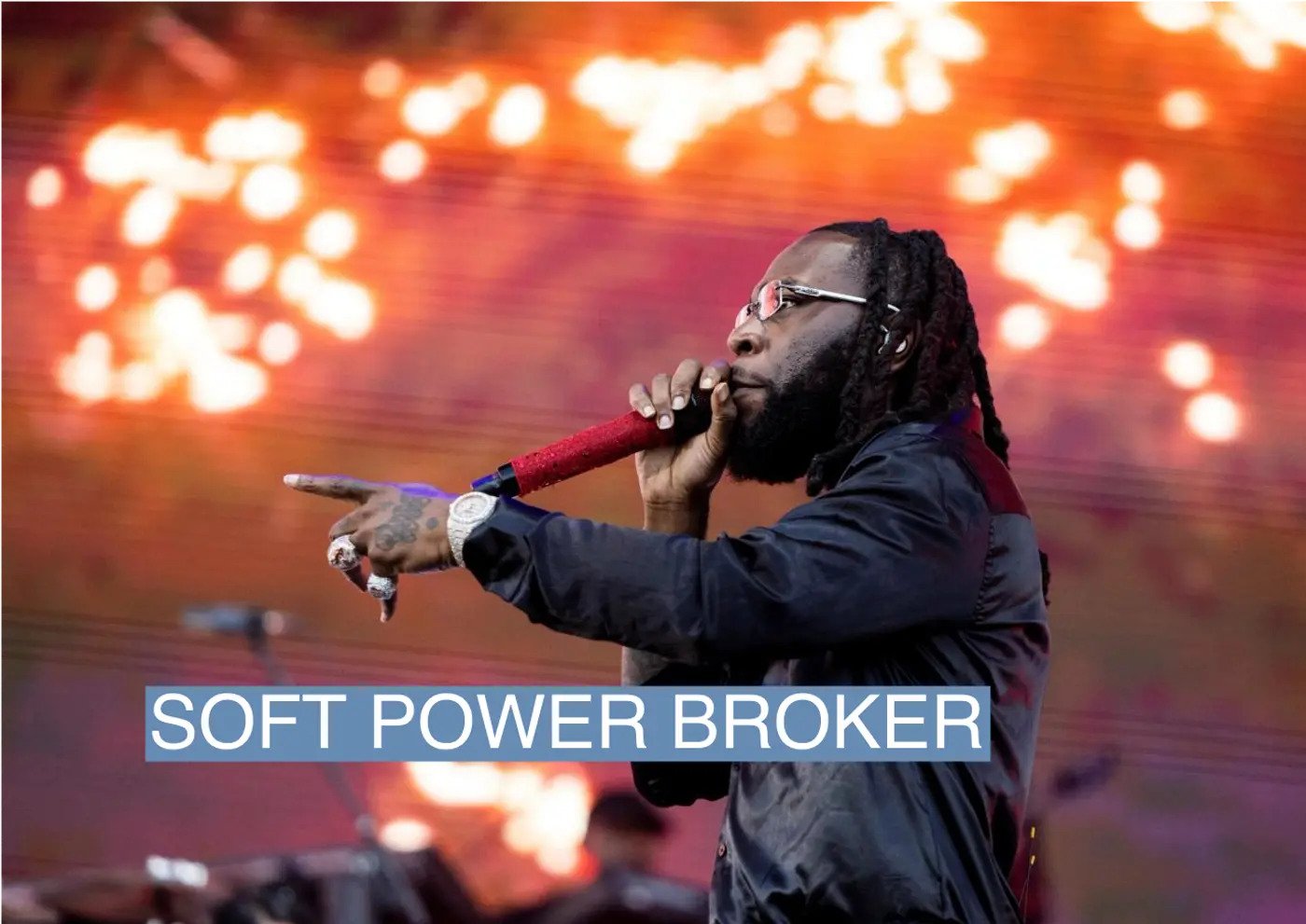Burna Boy (c) Reuters/Aude Guerrucci
This month of May has been filled with travels, talks and events, and June is shaping up to be much of the same.
In May alone, events relevant to the African creative industries have included:
📆 16-27 May
🇫🇷 Cannes, France
👉 Festival de Cannes, with The African Pavilion, Pavilion Afriques and AfroCannes, 3 separate initiatives to support African cinema
📆 18-21 May
🇲🇦 Rabat, Morocco
👉 The MOCA, Movement of Creative Africas, the forum of African cultures and Diasporas
📆 20 May
🇳🇬 Lagos, Nigeria
👉 The Africa Magic Viewers Choice Awards (AMVCA), MultiChoice Group's annual event recognizing outstanding achievement in television and film
📆 23-27 May
🇷🇼 Kigali, Rwanda
👉 Basketball Africa League (BAL) Finale
👉 BAL Innovation Summit (May 25), bringing together leaders from business, technology, sports and entertainment
👉 Annual summit of The Africa Soft Power Project, premier event for Africa’s creative and tech industries
📆 24-26 May
🇸🇳 Dakar, Senegal
👉 FORAFRICC Summit, Forum African pour les Industries Culturelles et Creatives (Youssou Ndour Foundation)
📆 25 May
🌍 Worldwide
👉 Africa Day celebrations
📆 27-28 May
🇺🇸 Miami, USA
👉Afro Nation Miami, annual three-day music festival
🤯 There's just too much going on right now in the African creative and sports space for anyone to keep track. It was time to curate a list of the most relevant events, so I stepped up to the plate.
Hopefully this can become a collaborative project - you should be able to comment directly in the document to let me know if anything is missing. Or just sent me a DM or an email, and I'll add your event to the spreadsheet.
In other news this month:
FILM
✨ The 76th edition of the Cannes Film Festival turned out to be the best vintage yet for Africa.
First, a record number of African films premiered at the festival, including two titles in the main competition. Read about the full list here.
Then, a total of four African films bagged awards in the 'Un Certain Regard' category: Les Meutes by Kamal Lazraq (Morocco) won the Jury Prize, Kadib Abyad by Asmae El-Moudir (Morocco) got the Directing Prize, Belgian-Congolese musician and actor Baloji won the New Voice Prize for Augure, and Goodbye Julia by Mohamed Kordofani (Sudan) received the Freedom Prize award.
💵 But this Cannes Film Festival was a great one for Africa also because, suddenly, there is money willing to back African projects.
Key financiers for African film include the African Export-Import Bank (Afreximbank) and its $1 billion creative fund, which I had the opportunity to help design, and Saudi Arabia’s Red Sea Fund, which last year provided $14 million in financing to films from Africa and the Arab world.
International film financing companies, such as Creative Wealth Media and Convergent Media Capital, are also now starting to put African films on their radar.
🤔 Why now?
✅ Sata Cissokho, head of acquisitions at Memento International, attributes this shift to the emergence of a new generation of African filmmakers, "who grew up having access to what the world had to offer in terms of filmmaking and who are now using this to complement what their cultural heritage gave them.”
“It’s no longer about making the films that are expected from the continent but making the most of the richness of their cultures, combining the African art of storytelling with the Westernized codes of narration.”
🙌🏿 The creative holy grail that the industry has been chasing for years might finally be in sight.
✅ African storytelling is benefiting from the growing diversity push in Hollywood, initially spurred by the 2018 success of the first "Black Panther" movie and the Black Lives Matter movement.
✅ Finally, the arrival of Netflix and other streaming platforms on the continent has been and continues to be instrumental in offering "new horizons" to filmmakers, both literally and metaphorically.
SOFT POWER
The buzz surrounding the success of African filmmakers at Cannes showed us that African governments should prioritize having a robust soft power strategy.
🤔 Why, when there are so many other pressing problems to address, such as electricity, infrastructure, education, or health?
💰 Because having a strong national narrative based on a country's most inspirational assets - its nature, culture, artists, and athletes - can help unlock the resources needed by all these other sectors.
🌟 The more Africa will shine on the global creative scene, the more investors will line up to finance roads, schools and hospitals.
As Kelis famously said, "my milkshake brings all the boys to the yard".
👉🏾 Hollywood successfully sold the American dream for decades -- it is only now starting to crumble faced with the rough reality of the country's decline.
👉🏾 Over the past 30 years, South Korea masterfully transformed itself into a beacon of global pop culture by investing strategically into its creative industries, now known as the 'K Wave' or 'Hallyu'. In 2021, Hallyu had an estimated $12.45 billion boost on the Korean economy.
👉🏾 Colombia achieved a tricky rebranding from a dangerous narcostate to "the most welcoming place on earth", and is now well on its way to becoming a significant tourism destination. The country was named one of "52 places to love in 2021" by The New York Times.
In Africa, major results could be achieved by pushing through key measures at a very low cost:
✅ Name a culture minister who actually knows about culture
✅ Pass a creative bill that sets a clear ambition and agenda for the country
✅ Partner with development organizations to gather and track data on the country's creative sector
✅ Get serious about film incentives and co-production treaties - they matter very much
✅ Instead of putting money in, just avoid taking money out - establish tax moratoriums on creative activities, make investments in the creative sector tax deductible
✅ Organize a world-class festival in an area the country is particularly strong in
✅ Sponsor artists and athletes to attend events abroad
✅ Leverage the power of the diaspora
Then sit back, and see what happens.
CONTENT PRODUCTION
🇫🇷 While African filmmakers shine in the South of France, French media companies are continuing their expansion into Francophone West Africa. And now they're getting increasingly involved in content production.
After acquiring 🇸🇳 Senegal-based Keewu Production a couple years ago, French content behemoth Mediawan has now taken a majority stake in Bernard Azria's distribution and production outfit Côte Ouest, based in 🇨🇮 Ivory Coast.
To give you an idea of how big and influential Mediawan is: last December, the French group acquired Brad Pitt's prestige production company Plan B 🤯
💃 Meanwhile, among other feats, Côte Ouest is known to industry insiders as the entity responsible for bringing Latin American telenovelas to the African market in the 1990s. Telenovelas, both foreign and locally-produced, have since become one of the most popular genres of entertainment across the continent.
French operator Canal+ International, which holds a de facto monopoly on Pay TV in Francophone Africa, will also hold a minority stake in Côte Ouest.
Back in 2019, Mediawan and Canal+ had already partnered on an African project -- launching a joint venture to develop and produce original African content in the French language.
In Francophone Africa, all content roads lead to Canal+.
SPORTS BUSINESS
🥊 The Professional Fighters League (PFL) is coming to Africa, and the league has unlisted former UFC heavyweight champion Francis Ngannou as its Africa Chairman.
Ngannou made the switch to PFL from competing league UFC, with whom he controversially parted ways last year. He will fight in PFL's nascent Super Fight division, which was created to attract fighters to sign deals with more favorable terms.
🤝 This time, Ngannou positioned himself more strategically. For PFL, he will not only be a fighter, but also a business partner. The Cameroonian champion will advise the league on its expansion to Africa, which is slated to start in 2024.
🌍 The process includes scouring the continent for fighters and for countries to host fights. According to Ngannou, Cameroon, Nigeria, Senegal and South Africa are early targets.
Africa has been on the radar of the Mixed Martial Arts (MMA) world for some time.
🥇 Until August 2022, all 3 major UFC titles were held by African champions: Ngannou (heavyweight), Israel Adesagna (middleweight) and Kamaru Usman (welterweight).
Recently valued at $12.1 billion, UFC is considered the most valuable MMA promotion company. Its charismatic president Dana White has publicly said that expanding to Africa was a priority and that, in addition to hosting events, the league planned to bring a UFC Performance Institute to the continent.
🤜🏿🤛🏿 It seems that UFC and PFL are ready to take their rivalry to Africa.
Meanwhile, other operators such as Bellator MMA, Vivendi's ARES Fighting Championship, Singapore-based ONE Championship, as well as emerging local ones, are also gearing up to enter the ring.
This is shaping up to be a properly stacked fight card.
PODCAST
📢 Finally, I'm very glad to be featured in the new season of the Change Africa Podcast alongside 11 other inspiring and insightful thought leaders, including Ken Agyapong Jr, co-founder and CFO of AfroFuture Festival (Formerly Afrochella); Benny Bonsu, Director of Content at the International Olympic Committee; Anita Erskine, CEO of Anita Erskine Media; Ashleigh Moolman Pasio and Xylon Van Eyck, Olympian and founders of Rocacobra Collective; Paul Ninson, Founder of Dikan Centre; Daniel Damah, Film Producer; Adora Mba, Founder and director of ADA \ contemporary art gallery; Addy Awofisayo, Head of Music, Sub-Saharan Africa at YouTube; and Joshua Buatsi, 2019 British Light Heavyweight title holder and Olympian.
Listen to the first episode with Lucy Quist, Managing Director, Morgan Stanley & author of the ‘The Bold New Normal’, and watch out for the others -- mine will be out on June 22nd!
🎧 Change Africa on Spotify: https://lnkd.in/eXut5A-3
🎧 Change Africa on Apple: https://lnkd.in/dAykvMpR

